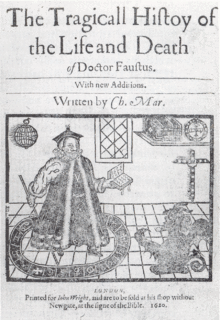
Back دكتور فاوستس (مسرحية) Arabic Трагичната история за живота и смъртта на доктор Фауст Bulgarian ডক্টর ফস্টাস Bengali/Bangla Die tragische Historie vom Doktor Faustus German Η τραγική ιστορία του δόκτορος Φάουστους Greek La trágica historia del doctor Fausto Spanish دکتر فاستوس (نمایشنامه) Persian La Tragique Histoire du docteur Faust French דוקטור פאוסטוס (מחזה) HE La tragica storia del Dottor Faust Italian
| The Tragical History of the Life and Death of Doctor Faustus | |
|---|---|
 Frontispiece to a 1620 printing of Doctor Faustus showing Faustus conjuring Mephistophilis. The spelling "Histoy" is agreed to be a typographical error.[1] | |
| Written by | Christopher Marlowe |
| Characters | Doctor Faustus Lucifer |
| Date premiered | c. 1592 |
| Place premiered | England |
| Original language | Early Modern English |
| Genre | Tragedy |
| Setting | 16th century Europe |
The Tragical History of the Life and Death of Doctor Faustus, commonly referred to simply as Doctor Faustus, is an Elizabethan tragedy by Christopher Marlowe, based on German stories about the title character Faust. It was probably written in 1592 or 1593, shortly before Marlowe's death. Two different versions of the play were published in the Jacobean era several years later.[2]
The play is well-known for a famous line: "Was this the face that launched a thousand ships / And burnt the topless towers of Ilium?", said by Faustus upon seeing a demon impersonating Helen.[3] The line is a paraphrase of a statement from Lucian's Dialogues of the Dead.[4][3] It is frequently quoted out of context to convey astonishment at Helen's beauty.[3] However, in Doctor Faustus, it is said to a devil posing as Helen, and is a response to the illusion; it may even express disappointment that she is not more beautiful.[3] The German poet and polymath Johann Wolfgang von Goethe re-envisioned the meeting of Faust and Helen. In Faust: The Second Part of the Tragedy, the union of Helen and Faust becomes a complex allegory of the meeting of the classical-ideal and modern worlds.
- ^ "CLASSIC POETRY for Christopher Marlowe's Deathday: The Survival of "Doctor Faustus"".
- ^ Logan, Terence P.; Denzell S. Smith, eds. (1973). The Predecessors of Shakespeare: A Survey and Bibliography of Recent Studies in English Renaissance Drama. Lincoln, NE: University of Nebraska Press. p. 14.
No Elizabethan play outside the Shakespeare canon has raised more controversy than Doctor Faustus. There is no agreement concerning the nature of the text and the date of composition... and the centrality of the Faust legend in the history of Western world precludes any definitive agreement on the interpretation of the play...
- ^ a b c d Maguire, Laurie (2009). Helen of Troy: From Homer to Hollywood. Chichester, England: John Wiley & Sons, Ltd. pp. 160–163. ISBN 978-1-4051-2634-2.
- ^ Casson, Lionel (1962). Selected Satires of Lucian, Edited and Translated by Lionel Casson. New York City, New York: W. W. Norton and Company. ISBN 0-393-00443-0.